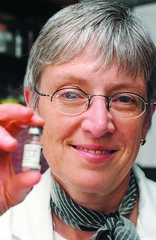
Kathryn Edwards works to find a vaccine that would protect everyone from a pandemic flu. Photo by Dana Johnson
Vanderbilt University Medical Center will receive nearly $24 million from the federal government over the next seven years to continue evaluating innovative vaccines for pandemic flu, malaria and other infections. Vanderbilt’s Vaccine and Treatment Evaluation Unit is one of eight in the country funded by the National Institutes of Health (NIH).
“Obtaining funding for this contract is remarkable, especially in light of shrinking federal budgets for research,” says Dr. Jeff Balser, associate vice chancellor for research. “Vaccine development is a powerful tool to fight disease on a broad public scale.”
Over the years Vanderbilt’s unit has morphed from a small vaccine clinic serving children to a testing center of national importance, beginning when swine flu hit in 1976. The VTEU was the basis for establishing Vanderbilt’s HIV Vaccine Testing Unit in 1988. Its long history of responding quickly to the microbial hot topic of the day has made Vanderbilt an international leader in vaccine research.
“The contract will allow us to address growing challenges in this area of research,” says the unit’s principal investigator, Dr. Kathryn Edwards, professor of pediatrics and director of the Division of Pediatric Clinical Research. Among the challenges: how to increase the number of participants in these important studies.
“Those folks who have already participated in pandemic flu trials will not be eligible to participate in another round of these trials. We need new volunteers.”
Edwards says the VTEU will also work to increase racial and ethnic diversity “so that if there were a pandemic flu, we would have vaccine that would work for all.”
Some of the funds will support development of substances that can enhance the strength of the vaccines and thus reduce the amount and number of doses needed.
“That might mean, in the case of pandemic flu, that we can protect our population and others in developing countries that do not have the potential to make vaccines,” Edwards says.
Vanderbilt researchers also are working on cytomegalo-virus (CMV) prevention, new types of seasonal influenza vaccines and, in collaboration with colleagues at Stanford University, an innovative malaria vaccine that uses a malaria protein carried in the common cold virus.